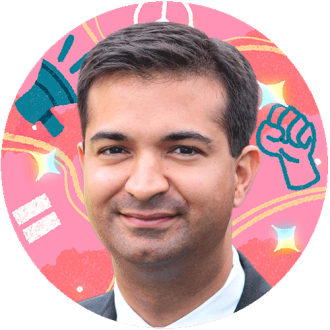We’re all eager to put 2020 behind us. There’s no guarantee we’ll have easier days ahead — our nation is as divided as ever, the pandemic rages on, and the climate crisis is still, you know, a crisis. To put it simply: We’ve got work to do. But as this record-settingly terrible year draws to a close, Fix is taking a look at some of the bold climate and justice trends we see coming in 2021.
Our team asked 21 Fixers and climate celebs for their predictions, priorities, and plans. Artists, entrepreneurs, chefs, policy wonks, and community leaders of all stripes shared their visions for what could happen in 2021 — and what must happen, if we hope to solve the climate crisis. Read on for high-definition views of the world we could be living in a year from now, and real talk about how we get there. All responses have been edited for length and clarity.
Business & Tech
Buildings will go electric

“Buildings’ energy use contributes 30 percent of all greenhouse gas emissions in the U.S. That will change as more cities follow San Francisco’s recent ban on natural gas in new buildings. As we work toward electrification, I think the construction industry will make use of cold-climate heat pumps, which allow whole buildings to move off of fossil fuels in the same way Tesla can move cars off of gasoline. BlocPower will demonstrate that technology in 50 to 100 buildings in a pilot project in New York to show that we can take climate action while recovering from both the pandemic and the economic crisis by improving ventilation and creating jobs.
Joe Biden has stated in his climate policy that 40 percent of climate investments must benefit historically disenfranchised communities. Building electrification will play a key role in achieving that goal.”
Business & Tech
‘Sustainable’ fashion will actually mean something

“We’ve been working on shifting the narrative from ‘sustainable fashion,’ which has become so overused as to be meaningless, to a conversation about what brands are specifically doing to reduce their impact. Our priority for the year ahead will be getting the leading brands to disclose their true environmental and social footprint. Without this, we’re playing a dangerous game of trust. We must clear up greenwashing in the year 2021 — if we cannot do that then we’re all stuck in the mud and can’t make the critical progress we need.
On the consumption side, the New Standard Institute is looking to change a cultural narrative. We’re working with celebrities and influencers to spread awareness about the impact of all of our clothing and normalize wearing clothes a reasonable number of times. Surveys today find that some people consider clothes old after only wearing them once or twice. That’s just insane.”
Arts
Artists will gain the recognition they deserve

“In the year ahead, I think we’re going to see more artists engaging in climate issues and centering environmental justice in their work. This trend has already begun — I look at how Black and brown people have used their voices to talk about racial issues in conversations about the environment and climate change. People are starting to realize that to survive the climate crisis and this political tension, which is all intertwined, we need to build up the cultural sector.
Since the beginning of the pandemic, there has been a major shift in both philanthropy and organizational focus toward digital engagement. That has led to arts and culture gaining the respect that they haven’t traditionally had, because social media is highly influenced by visual and mixed-media art. I hope organizations continue to build resources and infrastructure for the arts, and encourage commissions that both build a vision for the future and mirror the world we’re currently seeing so we can grow and amplify at a faster rate. That is what climate change will require us to do.”
Food
The economy, the planet, and the workforce will win — together

“I’m hopeful that newly deemed ‘essential workers’ may have more leverage to demand a living wage and reasonable labor protections. These may not sound like climate issues, but nearly all of the food-system practices that are most problematic from a climate standpoint hinge on having an exploitable workforce. Protect the workers and you have a prayer of protecting the planet.
The imperative of rebuilding the economy presents many opportunities to ‘build back better’ — there are a lot of big economic choices that have not been made yet, and the collective IQ around organizing and participating in the political process has leveled up dramatically. One concrete example: The Justice for Black Farmers Act, introduced by Senators Cory Booker and Elizabeth Warren, would create an Equitable Land Access Service, backed by an $8 billion fund, and a Farmland Conservation Corps to ensure young people from all backgrounds can become regenerative farmers. This legislation is possible because of decades of dedicated activism, and it could be passed in 2021.”
Policy & Advocacy
Sustainability and equity will guide city planning

“When you look at what the incoming administration is prioritizing and what the marketplace is telling us, I think we are starting to see the momentum that sustainability professionals have been waiting more than a decade for. I’m happy to say that we have committed the city of Orlando and our electric utility to net-zero carbon by 2050. If you had asked me a year ago whether we would get our utility — the 14th largest in the country — to commit to net-zero and early retirement of their coal-fired power plants, I would have laughed.
We also are about to hire our first chief equity officer. Ultimately, the climate crisis is a racial-justice crisis. Over the last two to three years, I’ve seen a change in tides of sustainability and resilience professionals doing the hard work of centering equity. Addressing those issues in parallel, through a comprehensive and holistic approach, is needed. And it’s a trend we’re beginning to see across the country.”
Arts
Local creatives will get a bigger spotlight

“Art Basel Miami Beach, an international art fair in Miami, was canceled this year. That was a blessing in disguise. Instead of flying in big names, the city is starting to appreciate and support the incredible artists in its backyard. I think that’s a trend that will continue, especially in the environmental space. Local artists know their communities best and can use the relationships they’ve built to engage their neighbors on climate action. Muralists in particular have an opportunity to reach audiences beyond the exclusive art world, capture people’s imaginations, and paint visions for a better future. Activists, governments, and businesses will want to tap into that and partner with artists to spread awareness about their work and build a rich local movement.”
Food
We’ll grow strong regional food systems

“As global supply chains fracture and grocery store shelves dry up, consumer demand for local products is growing. Nebraska is seeing new energy around legislation that supports a decentralized network of meatpacking plants, which could help enforce worker safety, generate revenue for small ranchers, and strengthen regional marketplaces. With that comes more opportunities for regenerative agriculture, which cultivates soil health and draws down carbon.
But local, sustainable farming means so much more than that. It creates food security. It fosters relationships between rural and urban entrepreneurs. It connects consumers with farmers. It even protects clean water. I’m looking forward to all of those things coming to fruition now that public support is strong and we have an administration that’s willing to fight for them.”
Policy & Advocacy
We’ll see political support for climate action — from Republicans

“With Donald Trump out of the picture, Republicans will have more space to engage on climate. He was the greatest obstacle to progress over the last four years. Add to that the fact that there’s a new generation of Republicans entering Congress — young leaders, in some cases from progressive districts. It’s important for them to act, to show leadership on this issue and show their constituents that they have solutions.
For meaningful climate legislation to pass this year, the most important thing that can happen in the new few weeks and months is for the Biden administration to establish a healthy dialogue with Republican senators who have a history of working on climate. Big issues that require complex solutions will always need a minimum degree of support from both parties. Building trusting relationships would be a wonderful investment when it comes to accelerating bipartisan consensus on climate.”
Science
Scientists will look toward the past to map out the future

“I’m hopeful about the recent trend of recognizing that what’s past isn’t really past. For example, our January study showed that discriminatory housing policies put into place nearly a century ago echo as environmental-justice issues today. This, plus a renewed interest in mapping disproportionate impacts to inspire environmental-justice work, makes it clear that we have a roadmap to follow. Over the next year, we will continue to dig into historical patterns of climate and environmental inequity and find new ways to engage broader audiences.
I expect that more cultural institutions, including science centers like ours, will see their role shift in the communities they serve — moving toward becoming one of many neighborhood nexus points for information and democratic deliberation around climate action. This integration of climate action into public education and community engagement is an exciting and rapidly developing area.”
Business & Tech
Startups will help catalyze climate justice

“Elemental Excelerator’s top priority is to help our 117 entrepreneurs bake equality into their startups’ DNA by encouraging them to examine whether diversity and inclusion are core to their hiring processes, their retention rates, and their supply chains. We’re asking them, ‘What does your product mean for the communities you work in? How do you ensure that you’re creating mutual benefit? Do you understand the unintended consequences of your technology?’
Over seven years, the cleantech startups in our portfolio have learned so much from working and building in their communities. We plan to share those experiences and scale up their technology — from underground power lines to using drones to assist with reforestation — to help industries move toward decarbonization. 2021 is bringing an unprecedented opportunity for clean technology to play a huge role in both climate action and social justice.”
Food
Slow food will make a comeback

“After COVID, I don’t think we’ll see a restaurant boom like we had over the past 10 years. But I’m hopeful that we’ll see more intentionality and purpose-driven business models that go beyond just feeding people and making money. In some ways, I think this slowdown was a healthy psychological and emotional shift for the industry.
When the pandemic hit, the availability of certain food products dropped off a cliff. One thing that did was shift us even more toward purveying from local suppliers because they didn’t stop, which was interesting. I saw that in a lot of places. We’ve seen a return of the farm-to-table idea that was popular 10 or 15 years ago. With all the faults exposed by COVID, I think people will continue to be more cognizant of the supply chain and pay even more attention to where their food and ingredients come from.”
Food
People-friendly food policies will blossom

“The pandemic provided an opportunity for the industry to reflect on sourcing, worker benefits, systemic racism, and more. The work being done now will lead to wholesale changes from the fields to the halls of Congress. People will be looking beyond farm-to-fork labels, even natural or organic labels, and focusing on the people making their food, the strength of their communities, and the impact on the environment. This will drive increased participation in community-sourced agriculture, meat and animal shares, and even fish shares.
By the end of 2021, I want philanthropists to have stepped forward with $100 million to support a multiyear campaign to rebuild and strengthen our food system. That means removing the barriers that restrict localized food production and supporting more climate-friendly, people-friendly policies. The investment will pay for itself 10 times over and make the world a better — and more delicious — place.”
Science
Conservation will be intersectional

“People are realizing that, to protect wildlife, we don’t just have to wall off huge sections of land in the middle of nowhere. We need to optimize every patch of green space, whether it’s in a forest or a city, for the health of our ecosystems and our society. We’ll see urban gardens, for example, that attract insects and birds but also strengthen food access for communities.
By meeting people’s needs, conservationists will engage new audiences that bring diverse perspectives. For years we’ve known that STEM is overwhelmingly white, male, and older, but I’m encouraged by the fact that private and public organizations are finally funding programs to help BIPOC and those from low-income backgrounds fulfill their dreams of being biologists or conservationists. We need all hands on deck to protect biodiversity.”
Business & Tech
We’ll be one step closer to guilt-free flying

“The pandemic decimated commercial aviation, but times of crisis are when true structural change happens. I expect that federal agencies will want to play catch-up to European countries, which have been moving toward sustainable air travel for years. That means we will start to see more federal regulations on emissions and fuel efficiency, as well as investment in the development of electric and hydrogen-powered planes.
An electrified passenger airplane may seem wildly out there, but Ampaire just flew a six-seat hybrid-electric craft for 341 miles, our longest trip yet. Our planes are still in the development stage, but we’re continuing exciting pilot projects with NASA and the U.S. Department of Energy to complete test flights and mature our technology. Aviation is the final frontier of green transportation, and it isn’t far away.”
Policy & Advocacy
Climate and justice leaders will gain political power

“I expect that the left flank of the climate movement will build its ability to persuade other parts of the Democratic party to do some of the things that we want. There have been instances of that recently, like the Sanders-Biden Unity Task Force. I want to take that example and continue scaling it up. Often, progressive policy work can feel like slow boring through hard boards. But occasionally we get breakthroughs and playing a small role in them is really exciting.
One of the biggest and most encouraging stories is the extent to which environmental justice has been mainstreamed. Two names that I’ve seen floated for chair of the Council on Environmental Quality come out of the EJ movement — Mustafa Santiago Ali, who ran the environmental justice part of the EPA, and Dr. Cecilia Martinez from the Center for Earth, Energy, and Democracy. Back in July, Data for Progress put out the Progressive Cabinet Project, a fantasy football–style roster for cabinet picks. We included Representative Deb Haaland as a nominee for Secretary of the Interior. I’ll be honest, at the time I didn’t think that any of our suggestions would go anywhere. But now it looks like Representative Haaland could be the next Interior Secretary and the first Native person to hold that job.”
Science
Companies and countries will invest in nature

“Stopping deforestation and increasing ecosystem restoration offer up to 37 percent of the emission reductions needed in the next decade to keep global temperature increases under 2 degrees Celsius. The challenge has been creating a business incentive for realizing that potential. Now, countries are setting biodiversity targets for 2030, and major companies like Walmart are promising to protect and restore millions of acres of land — likely due to organizing by grassroots activists and frontline communities. Conservation International is at a pivot point where we must design the financial instruments needed to implement those solutions and channel investments into key areas to ensure the biggest impact. I think we’re on the cusp of changing the economics of how the world uses land and making sure that forests are more valuable standing than they are cut down.”
Policy & Advocacy
Electric cars will get a boost

“California’s recent decision to ban the sale of new gasoline-powered cars by 2035 will catalyze conversations about how we transition to electric vehicles. Through executive action, President Biden could encourage the auto industry to deploy more electric cars on a faster timeline by adopting tighter fuel standards and other regulatory frameworks. If done with racial justice in mind, investing in electrification could reduce pollution in frontline communities and help folks recover from the pandemic recession while creating a more equitable, regenerative economy. But I think activists, not politicians, are going to push for that. For example, The Greenlining Institute will ramp up our transportation equity programs, including electric car-share programs in low-income neighborhoods and EV financing assistance, and pressure lawmakers to make sure new charging infrastructure projects employ Black and brown Californians.”
Policy & Advocacy
We’ll see recognition — and restitution — for Black leaders

“Many of the issues central to structural racism are becoming central to the climate-justice field, especially for philanthropists. Funders are beginning to understand the importance of frontline leaders and Black-led organizations. I expect more conversations about not only reconciliation, but also restitution. I’m seeing foundations trying to itemize the damage that past policies, disinvestment, and violence have had on Black and brown communities and putting a dollar amount on that. I am also, finally, beginning to see people understand the importance of the South in moving the nation forward. Joe Biden wouldn’t have won the nomination if it weren’t for Black voters in South Carolina, and he wouldn’t have flipped Georgia if it weren’t for Black voters. The spotlight is moving toward Southern leaders, and more funding will follow.”
Policy & Advocacy
Youth activists will be raring to go

“2020 has been a year of preparation for the youth climate movement. Most of us were staying inside, so we had plenty of time for reading, learning, and sharing resources. Protesting also became experimental, with social media campaigns and shoe strikes that used symbolism rather than large gatherings.
Some of the best innovations happen when people are bored, and I think youth activists will use the knowledge and creativity we’ve gained to propel our movement forward. Next year, for example, we’re launching School Groups, which will help students learn about climate solutions and encourage their peers to take action. Joe Biden’s climate plan is the most comprehensive of any president-elect in history — but it’s on us to hold him accountable to make sure those solutions are actually implemented by recruiting more young people to our movement and, when it’s safe, taking to the streets in massive numbers.”
Policy & Advocacy
Climate and immigration justice will go hand in hand

“I see a lot of opportunity for climate and immigration activists to work at the intersection of those issues and create a cross-movement approach to push the Biden-Harris administration to be bold. Climate activists need to support immigrant-rights activists in their endeavors, and vice versa.
One point of interest for me is asylum and refugee policy. The U.S. does not allow people fleeing their countries to gain asylum or refugee status based on climate impacts. I would love to see a coalition formed to change that. If we’re going to talk about holding polluters accountable and the role of countries like the U.S. in creating the climate crisis, we must create a framework around reparations. Reparations for Black, Indigenous, and people of color in the U.S. who already face internal migration because of the climate crisis, and also for people coming to the West because of the climate crisis who are being blocked at the borders. Climate, immigration, the Movement for Black Lives, and all other issues of justice have to work in coordination. That’s the only way that we win.”
Arts
The climate chorus will reach the masses — with more voices than ever

“In 2021, it feels possible to move beyond hope and actually build an ambitious plan to tackle the climate crisis, then put that plan into action without the headwinds of the Trump administration. Media coverage has been increasing and more people are worried about climate change than ever before. I think 2021 is poised to be the year it goes mainstream. Newsletters like Heated and podcasts like How to Save a Planet (hosted by Fixer and marine biologist Ayana Elizabeth Johnson) are taking the issue to the masses while highlighting its intersections with racism, misogyny, and white supremacy. They also bring compassion, humility, and a focus on solutions. I hope to see these platforms grow their audiences and capacity in 2021 and a new diversity of voices joining the conversation.”
This post was originally published on Radio Free.